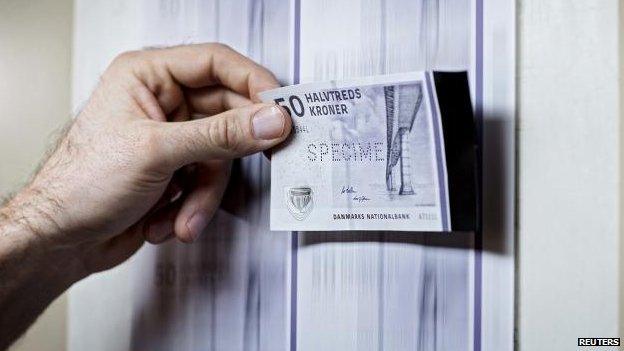Can Denmark succeed where Switzerland failed?
- Published
- comments

Denmark has the last strict euro peg after the Swiss abandoned its franc cap last month.
Denmark has certainly taken some unusual steps to defend the krone. It surprisingly suspended sales of all government debt to close down an avenue for investors to buy its currency.
This is after it tried cutting interest rates and buying up its own currency. The Danish central bank has pushed its interest rate deeper into negative territory to a record low of -0.5% after three rate cuts in two weeks - the last being triggered by the Swiss giving up their three-year euro cap.
So, Denmark's borrowing cost - the yield on 10-year government bonds - has dropped to the lowest in the world, apart from Switzerland which has a negative yield. Were it to borrow, Denmark would pay only 0.16%, which is lower than Germany at 0.31% and even Japan at 0.36%. Germany's borrowing costs, by the way, fell below Japan's for the first time today, so it looks worrying as the eurozone's benchmark bond is experiencing deflationary pressures.
By taking itself out of debt markets, the number of top rated sovereigns in Europe has dropped from six to five since Denmark is one of the half dozen that still holds an AAA rating from all three major rating agencies.
So, can it maintain this suspension or could it go the way of Switzerland?
Due to size of the market, for investors, Denmark doesn't have the same "safe haven" status as Switzerland. There aren't as many assets to buy and the market isn't as liquid.
Unlike the Swiss franc, which was pegged due to the temporary turmoil of the euro crisis three years ago, Denmark's currency has been pegged for decades - now against the euro and previously to the Deutsche Mark, and has weathered some fairly tumultuous times in the early 1990s.
Inflation is a measly 0.3% so there's scope for intervening in the currency as it doesn't (yet) have the sizeable balance sheet that contributed to Switzerland giving up its euro cap. We'll find out later today when the central bank releases its January data.
Government debt is low in Denmark, less than half of GDP, and there's no real issue in terms of financing given where rates are. But Denmark has high levels of privately-held debt, particularly in the housing market, which always raises concerns.
However, a positive side effect for borrowers of the negative interest rate is that for the first time, a Danish lender, Nordea Kredit, is reportedly paying mortgage holders to borrow money by charging a negative interest rate. But others are not following suit as it's unclear how to handle a negative interest rate.
Indeed, there are calls now in Europe to fashion IT systems and discuss how to manage negative interest rates. There's an estimated $4 trillion of sovereign debt, including even 10-year Swiss bonds, which have negative yields.
In this environment, the Danish krone could look attractive, and that could put pressure on the euro peg, especially as the European Central Bank will unleash quantitative easing or cash injections in March. We may soon find out if the Danes can succeed where others have failed.